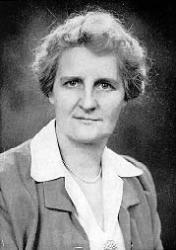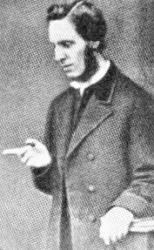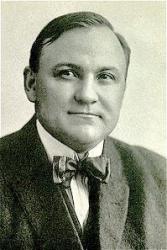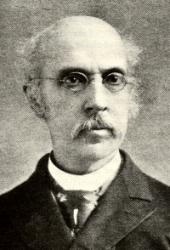Planning worship?
Check out our sister site, ZeteoSearch.org,
for 20+ additional resources related to your search.
- |
User Links
Person Results
‹ Return to hymnal






Export as CSV
Chas. H. Marsh
1885 - 1956 Person Name: Charles H. Marsh Hymnal Number: 68 Composer of "[Jesus may come to-day]" in The Tabernacle Hymns Born: April 8, 1886, Magnolia, Iowa.
Died: April 12, 1956, La Jolla, California.
Buried: Riverview Cemetery, Brawley, California.
Marsh’s father was pastor of the Congregational Church in Magnolia, Iowa. His gift for the piano was evident at an early age, and after he graduated from high school, Wilbur Chapman asked him to play for the Winona Lake Chautauqua and Bible Conference in Indiana. He later taught at the Bible Institute of Los Angeles (1915-19) and the University of Redlands (1919-26). He studied music in France in the 1920’s, and became president of the European School of Music and Art in Fort Wayne, Indiana. From 1928 to 1932, he played the organ at the First Presbyterian Church. In 1932, he moved to Florida to become professor of organ at the University of Florida, Gainesville, and to serve as organist and choir director at the First Baptist Church. In 1935, he moved to California, where he worked as district supervisor for the Federal Music Project in San Diego until 1939. He also played the organ and directed the choir at St. James-by-the-Sea Episcopal Church in La Jolla (1936-56).
Sources:
Erickson, pp. 345-46
Hustad, p. 281
http://www.hymntime.com/tch/bio/m/a/r/s/marsh_ch.htm
Chas. H. Marsh
Edward F. Rimbault

1816 - 1876 Person Name: E. F. Rimbault Hymnal Number: 173 Composer of "[O happy day that fixed my choice]" in The Tabernacle Hymns Edward Francis Rimbault PhD LLD United Kingdom 1816-1876. Born in Soho, London, England, son of an organist and composer of French descent, he was taught music by his father., Samuel Wesley, and Wiliam Crotch. At age 16 he became organist of the Swiss Church in Soho. He later became organist at various churches, including St Peter’s, Vere Street, and St John’s Wood Presbyterian Church. He edited many collections of music, journals, and publications of music, and arranged music compositions. In addition to editing or arranging contemporary operas, he had a strong interest in editing or arranging earlier English music. He studied the musical treatises in the library of Archbishop Tenison, one of the oldest public libraries in London. In 1838, At age 22 he began lecturing about the history of English music, and was in much demand due to the interest aroused. He did editorial work for the Percy Society, the Camden Society, the Motet Society, and the Handel Society. For the latter he edited the “Messiah”, “Saul”, and “Samson” He was elected a Fellow of the Society of Antiquaries, and was granted membership in the Academy of Music in Stockholm, Sweden. Gottingen University also conferred upon him a PhD. His reputation was such that he was offered a teaching position at Harvard University in the U.S., which he turned down. In 1848 he was given an honorary degree by the University of Oxford. In 1849 he published a collection of English nursery rhymes and the tunes to which they were sung. Rimbault authored 76 books, a few named here include : “Bibliotheca madrigaliana” (1847); “The pianoforte” (1860); “Early English organ builders and their works” (1865). In 1855 he co-authored “The organ- its history and construction” with John Hopkins. He did a small amount of composing as well. He wrote an operetta in 1838, and a musical drama. He also composed a large number of pianoforte scores for operas by others. He was an admirable harmonium player. Traveling to various auctions for years, he accumulated a rare collection of books. After his death his extensive collection was auctioned off in 1877, with many items going to the British Library. About 300 items were sold to an individual, and upon his death in 1888, the ‘Drexel collection’ was bequeathed to the Lenox Library (precursor of the New York Public Library). Today, the collection is part of the Music Division of the NY Public Library for the Performing Arts. He was an author, editor, arranger, composer, lithographer, translator, scribe, adapter, and bookseller. He died at London, England. No information found regarding a family.
John Perry
Edward F. Rimbault
Avis B. Christiansen

1895 - 1985 Person Name: Avis Burgeson Hymnal Number: 6 Author of "This Very Same Jesus" in The Tabernacle Hymns Avis Marguerite Burgeson was born in 1895 and lived in Chicago all her life. She attended the Moody Church, pastored for many years by Dr. Harry Ironside. In 1917, Avis Burgeson married Ernest Christiansen who later became a vice president of Moody Bible Institute. She was a modest and retiring woman, and sometimes used pen names: Avis Burgesson, Christian B. Anson and Constance B. Reid. She began writing poems in childhood, and before her death in 1985 had written thousands of them. She died in 1985.
NN, Hymnary
Avis B. Christiansen
Samuel O'Malley Cluff

1837 - 1910 Person Name: S. O'Malley Cluff Hymnal Number: 131 Author of "I Am Praying for You" in The Tabernacle Hymns Rv Samuel O'Malley Gore Cluff (Clough) United Kingdom 1837-1910. Born in Dublin, Ireland, he attended Trinity College and became a minister in the (Anglican) Church of Ireland. He pastored at various locations in Ireland. In 1884 he became leader of the Plymouth Brethren. He married Anne Blake Edge. They had four children. He wrote hymn poems and about 1000 songs. He composed many melodies and oratories. He died in Abbeyleix, Ireland. While holding crusades in Scotland with D. L. Moody, Ira Sankey came across Cluff's poem about prayer and composed the music for it, used in subsequent crusades.
John Perry
Samuel O'Malley Cluff
Charlotte G. Homer
1856 - 1932 Hymnal Number: 208 Author of "Awakening Chorus" in The Tabernacle Hymns Pseudonym. See also Gabriel, Chas. Hutchinson, 1856-1932
Charlotte G. Homer
Paul Rader

1879 - 1938 Hymnal Number: 60 Author of "To Eternity" in The Tabernacle Hymns Rader was one of the most powerful evangelistic preachers of the early 20th Century. He described himself as an ex-bellboy, ex-cowboy, ex-prospector, ex-football player, and ex-pugilist.
He was pastor of Moody Church in Chicago, Illinois (1915–21), and followed founder Albert Simpson as president of the Christian and Missionary Alliance (1920–23). He also founded the Chicago Gospel Tabernacle in 1922 and pastored it for 11 years.
Rader wrote many Gospel song lyrics and a few tunes, and was instrumental in founding of the Tabernacle Publishing Company.
Rader was a pioneer of Christian broadcasting, as well: In the early 1920’s, the beginning days of radio, station WBBM in Chicago, Illinois, closed every Sunday. Rader received permission to use the studios, and for several years ran a 14-hour Christian program every Sunday. Rader called his station within a station WJBT (Where Jesus Blesses Thousands).
--© Cyber Hymnal™ (www.hymntime.com/tch)
Paul Rader
Henry S. Perkins

1833 - 1914 Hymnal Number: 158 Composer of "[Blessed be the Fountain of blood]" in The Tabernacle Hymns Henry Southwick Perkins USA 1833-1914. Born at Stockbridge, VT, the son of musical parents (both singers) he was trained musically, primarly by his father. He attended some of the best literary schools in his youth. His formal music education began in 1857, when he entered the Boston Music School, graduating in 1861. For over 20 years he devoted considerable time to conducting music festivals and conventions throughout America, from ME to CA. He also taught music in NY, OH, IN, WI, IA, CO, KS, and TX. He served as Professor of Music at the University of IA (1867-69), principal of the IA Academy of Music, Iowa City, IA, for five years, and principal at the KS Normal Music School for five consecutive summers. He composed vocal music for choirs, Sunday school, public schools, choir societies, conventions and festivals. He helped organize the Music Teachers’ National Association in 1876, serving in most capacities there between (1887-1897). He also organized the IL Music Teachers Association in 1886, serving as its president for 10 years. He settled in Chicago in 1872 and was a noted music critic for the papers there. In 1891 he established the Chicago National College of Music. He published several hymn books, including: “The nightingale” (1860), “The church bell” (1867), “The song echo” (1971), “The sunny side” (1875), “The shining river” (1875), and “Gospel bells” (1883). He died at Chicago, IL.
John Perry
Henry S. Perkins
William Hiley Bathurst

1796 - 1877 Person Name: W. H. Bathurst Hymnal Number: 135 Author of "The Old Time Fire" in The Tabernacle Hymns Bathurst, William Hiley , M.A., son of the Rt. Hon. Charles Bragge (afterwards Bathurst) some time M.P. for Bristol, born at Clevedale, near Bristol, Aug. 28, 1796, and educated at Winchester, and Christ Church, Oxford, graduating B.A. in 1818. From 1820 to 1852 he held the Rectory of Barwick-in-Elmet, near Leeds. Resigning the Rectory in the latter year, through his inability to reconcile his doctrinal views with the Book of Common Prayer, he retired into private life, and died at Lydney Park, Gloucestershire, Nov. 25, 1877. His works include, The Georgics of Virgil: Translated by W. H. B., 1849; Metrical Musings; or, Thoughts on Sacred Subjects in Verse, 1849; and Psalms and Hymns for Public and Private Use, 1831 (2nd ed. 1842). This last contains 141 versions of Psalms, and 206 hymns. All the latter, and many of the former are original. Of his hymns, those in most extensive use are, "Hark! the distant isles proclaim," "Holy Spirit from on high,” "Jesus, Thy Church with longing eyes,” "Eternal Spirit, by whose power," "O for a faith that will not shrink” and “O Saviour, may we never rest." In addition to these and a few others (all of which are annotated under their first lines), the following are in common use, but mainly in America:—
1. Before Thy cross, my dying Lord. Faith.
2. Before Thy mercy-seat, O Lord. Holy Scriptures.
3. Behold what unspeakable love. Heaven.
4. Does the Lord of Glory speak? Holy Scripture.
5. Ere the world with light invested. Holy Spirit.
6. Except the Lord our labours bless. Ps. cxxvii.
1. Full of weakness and of sin. The Creator Spirit desired.
8. Glory to the Almighty Father. Praise.
9. Holy Lord, our hearts prepare. Preparation for Prayer.
10. Holy Spirit from on high. Holy Spirit's direction implored.
11. How blest are they who feel the weight. Repentance.
12. How strange that souls whom Jesus feeds. Conflict.
13. How sweet it is in early youth. Youthful Piety.
14. How sweet the hour of closing day. Death.
15. Led by a Father's gentle hand. Communion of Saints
16. Lord, a better heart bestow. Lent.
17. Lord, bid the light arise. To the Holy Spirit.
18. Lord, shed Thy glory as of old. Whitsuntide.
19. Lord, what blessed consolation. Safety of the Church.
20. Lord, when our offerings we present. Offertory.
21. 0 for a beam of heavenly light. Lent.
22. 0 for that flame of living tire. Holy Spirit.
23. 0 give thanks unto the Lord. Ps. cv.
24. Shepherd of Israel, from above. On behalf of Children.
25. This day the Lord hath called His own. Sunday.
26. When the world my heart is rending. Heaven.
27. Why search ye in the narrow tomb? Ascension.
28. Ye servants of the living God. Praise.
All these hymns were given in his Psalms & Hymns , &c, 1831 (Preface dated November 15th, 1830), and repeated, without alteration, in the 2nd ed., 1842. They are characterized by simplicity of language, and directness of aim; but do not in any instance rise above the ordinary level of passable hymn-writing. In some American collections Bathurst's name is contracted to "Bath," and this is regarded either as a complete surname or as a Bath Collection. The contraction was given by Bickersteth in his Christian Psalmody, 1833.
--John Julian, Dictionary of Hymnology (1907)
===================
Bathurst, William H., p. 117, ii. Additional hymns from his Psalms & Hymns, 1831, are in common use as follows:—
1. Great God, when I approach Thy throne. Redemption.
2. How bright a day was that which saw. The First Sabbath.
3. How frail and fallible I am. Jesus Unchangeable.
4. In Jesus' name with one accord. Divine Worship.
5. Lord, I claim Thee for my own. Ps. lxiii.
6. Lord shew Thy glory as of old. This is not "Lord shed Thy glory, &c," as stated at p. 118, i., 18.
7. Lord, when I lift my voice to Thee. Ps. ci.
8. O Lord, defend us as of old. Ps. lxxiv.
9. O Lord, how long shall heathens hold. Ps. lxxix.
10. 0 Lord, look down with pitying eye. Intercession for the Jews. Begins with st. iv. of “0 how is Zion's glory gone."
11. Praise God, O my soul. Ps. cxlvi.
12. Saviour, at Thy feet we bow. United Prayer.
13. 'Tis past, that agonizing hour. Ascension.
14. The Lord look'd all around. Universal Corruption.
15. To the Source of every blessing. Praise to the Father.
16. What can relieve the troubled soul? Christ the Comforter.
--John Julian, Dictionary of Hymnology, Appendix, Part II (1907)
William Hiley Bathurst
John Wyeth
1770 - 1858 Hymnal Number: 252 Composer of "NETTLETON" in The Tabernacle Hymns
John Wyeth


 My Starred Hymns
My Starred Hymns


